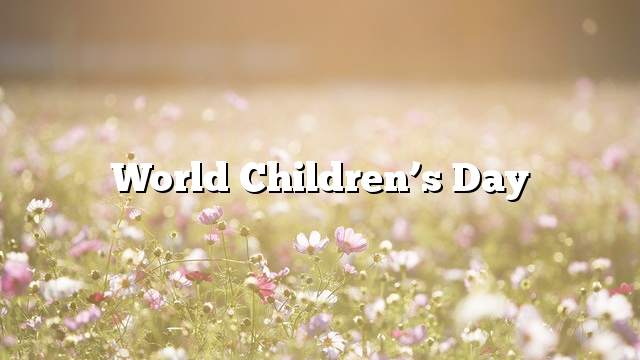World Children’s Day
The General Assembly of the United Nations in 1994 called on all States to establish a World Children’s Day without defining this day, and the 20 November was set after the signing of the Convention on the Rights of the Child on 20 November 1989, which also dates back to the First Declaration Of the Convention on the Rights of the Child, which was signed on 20 November 1994, and one hundred and ninety-one States signed this Convention.
Child Rights
Around the world, around the world, nine thousand nine hundred and ninety-nine children need a convention of their own, and children under the age of 18 need special care.
UNICEF’s role is to advocate for and protect children’s rights and to help them meet their basic needs by providing them with all opportunities to reach their maximum potential. The Convention on the Rights of the Child sets out the fundamental human rights that all children around the world must enjoy without discrimination. Article and Optional Protocols, the rights of the child are:
- The right of children around the world to stay.
- Their right to growth and development.
- Protect all children from the negative effects that harm them.
- To protect them from ill-treatment and to attempt to exploit them in any form or manner.
- Ensure full participation in the family and social and cultural life.
Principles of the Convention on the Rights of the Child
States:
- Non-discrimination in any form.
- Cooperate and join forces to promote the best interests of children around the world.
- Ensuring the child’s right to life, like all his peers around the world.
- Ensure their right to survival, life and development.
- Ensure his right to respect his opinion.
The Convention protects children’s rights by setting standards for health care and education as well as civil, social and legal services directly related to children. Governments that have signed and signed this Convention have committed themselves to implementing the provisions of the Convention and to assume full responsibility for the protection of children and their rights , And obligates States to develop policies and procedures to ensure the best interests of the child.
The basic content of children’s rights
- Without discrimination or discrimination, the right to enjoy the rights set forth in the Convention and to avoid any discrimination on grounds of color, race, religion, sex, national or social origin, descent, wealth or any other cause.
- Provide the child with facilities and opportunities that contribute to his / her mental, physical, spiritual, moral and social development in a dignified and free environment and to provide special protection for him / her.
- Every child has the right to have a name and nationality from the moment of birth.
- All children must enjoy the benefits of social security and be eligible for healthy and healthy growth. Care and protection should therefore be provided to the mother before and after childbirth, and the right of the child to food, shelter, recreation and health services.
- Children with physical or mental disabilities or those who have been socially excluded have the right to education, treatment and the provision of the necessary care required by their cases.
- The child should be separated from his mother only in special cases. The society should provide special care for children deprived of the family and poor children.
- The right to education, so that education is compulsory at least in the primary stage, and the responsibility lies primarily with the parents.
- Protecting children from all forms of cruelty, neglect and exploitation. It is prohibited to force children to work in all circumstances, or to approach occupations and jobs that are dangerous to their health and health, or impedes their receiving science or obstructs their mental, moral and physical development.
- Protect children around the world from all forms of racial, sexual or religious discrimination, or any form of discrimination, and to foster the spirit of cooperation, tolerance, peace and universal brotherhood in it.
